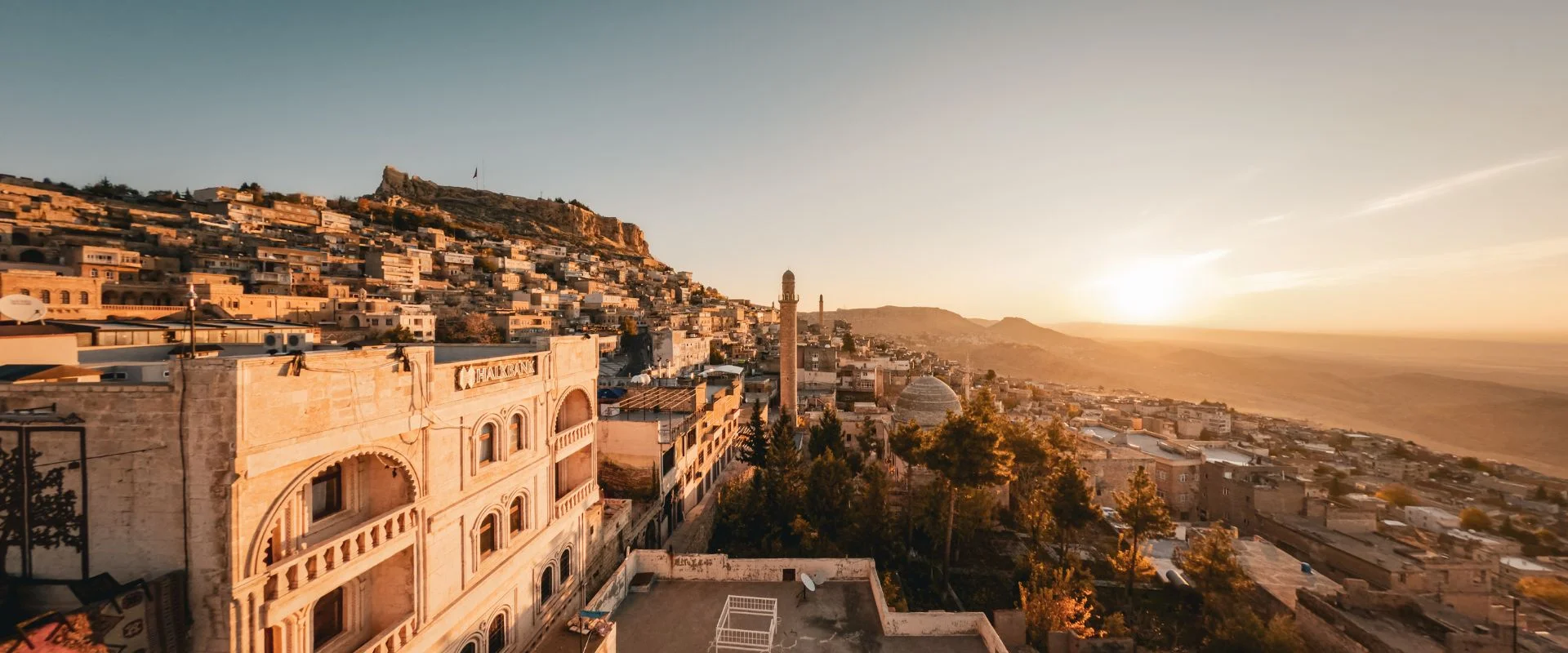- by Carrie Shaw
- on August 29, 2023
A Long Shadow Over The Holy Land
This article isn’t intended to be a political piece, though I acknowledge it may be perceived as such. I also acknowledge that the situation in the Middle East is undeniably sensitive, and so I’m doing my best to approach this subject with care. Emotions run deep on all sides – and I hesitate to even phrase it like that – because my goal isn’t to deepen the divide or suggest that one must choose a side at all.
The reality is, however, the world feels sharply split right now: pro-Palestinian or pro-Israeli and the gap only seems to be getting wider. Along with that widening gap is a troubling and disturbing shift in how Jewish people are being spoken about and portrayed. What I’m witnessing is a revival of antisemitism (or was it ever really dead?) and its re-emergence is deeply concerning.
Despite many arguing that the current situation in the Middle East isn’t complex, I think most would agree it’s impossible to speak about one part of this conflict without wading into others. The humanitarian crisis in Gaza is heartbreaking – and yet talking about it in isolation often invites accusations of bias or omission. Likewise, speaking about the trauma of Israeli civilians without referencing the broader context can feel incomplete or one-sided.
My attempt in writing about the situation is not, in any way, to put forward what might be heard as “a magical solution”. I don’t know how to resolve the crisis. It’s well outside my scope of influence and far above my pay grade.
But, what I do know is this: the world is in desperate need of the healing notes of grace. Not louder arguments, but softer hearts. Not more division, but the courage to see the humanity in one another. As Philip Yancey writes in ‘What’s So Amazing About Grace’, “The only hope for the future lies in an all-embracing attitude of forgiveness of the peoples who have been our enemies.”
Yancey speaks primarily, of course, to a Christian audience – yet his words resonate beyond that context. In a world that is quick to label, divide, and retaliate, forgiveness feels radical and all too often unachievable. Grace is perhaps the world’s last, best word, and it’s in that spirit that I offer the following thoughts on the Israeli–Palestinian conflict.
Silence Isn’t Neutral
I’m not here to catalogue each side’s wrongs or tally who has behaved worse, as if that could somehow clarify this crisis. I am not attempting to wade into a debate about the Israeli government’s policies, the legitimacy of Hamas, or the tangled web of international alliances and political interests. That’s not the purpose of this article.
My aim is to encourage thoughtful consideration as to how we, both individually and collectively, might step into conversations about the situation with humility, compassion, and a refusal to dehumanise the other. I hope to encourage a response marked by restraint and compassion for all – but especially for the many Jewish people around the world (the diaspora) and those who live in and call Israel home.
I’m seeing too clearly the rising undercurrents of antisemitism, often hidden beneath the surface of political rhetoric, and the change in atmosphere concerns me deeply.
Nearly 100 years ago, the world looked away as one of the greatest atrocities in history unfolded – the systematic, targeted slaughter of an entire people group.
Now, due to a lack of education about Jewish history, not just recent but throughout the centuries, and the awful events of the Holocaust, and the perpetuation of harmful stereotypes, many are failing to recognise antisemitism even as it resurfaces in new forms. It is to this reality that I specifically write: not to assign blame, but to urge awareness, to call for compassion, and to remind us that silence in the face of rising hatred is never neutral.
Nothing I share here is intended to downplay or dismiss the suffering of the people of Gaza.
The History Of The Jews
Despite what many may assume, Jewish people are not newcomers to the land historically known as Palestine. They are, in fact, an indigenous people, with cultural and historical roots in the region stretching back thousands of years.
The Jewish people trace their origins to the ancient land of Israel more than 3,000 years ago, making them one of the oldest continuous cultures connected to a specific region.
Over the centuries, the Jewish people faced multiple invasions and endured foreign rule – beginning with the Babylonian conquest and exile around 586 BCE, and later a major expulsion under the Roman Empire around 70 CE. Yet despite a large proportion of Jews being exiled and scattered throughout the world (known as the diaspora), Jewish communities have always remained in the region. Their presence, though often small and under pressure, never entirely disappeared.
Throughout the centuries that followed the majority expulsion under the Roman Empire, a Jewish presence in the land persisted, concentrated in cities like Jerusalem, Safed, Tiberias, and Hebron, cities of deep spiritual significance to Jewish life.
Although the community faced periods of hardship and discrimination through the subsequent centuries that followed, Jews continued to live, work, and worship in their ancestral homeland. However, by the late 1800s, as waves of antisemitism surged across Europe, many Jews began returning to the land, swelling the Jewish population in the region.
The pogroms of the late 19th and early 20th centuries in the Russian Empire were a major factor in the Jewish migration to Palestine. These pogroms were violent, state-tolerated (and sometimes state-instigated) attacks against Jewish communities, which included physical violence, looting, destruction of property, and murder.
Many Jewish people sought refuge elsewhere, leaving Eastern Europe for Western Europe, the USA, and what was then Ottoman-controlled Palestine.
The Rise Of Zionism
This period of persecution and instability saw the rise of Zionism – a political movement advocating for the right of the Jewish people to self-determination in their ancestral homeland – the land historically known as Israel.
While expressions of Zionism vary, its core principle is the belief that Jews have both a historical and modern right to live freely and securely in their ancestral land.
Today, however, the word Zionism is often weighed down by suspicion, distortion, and political bias. What began as a movement for Jewish self-determination is now, in many circles, viewed through a distorted lens, tangled in modern geopolitics and often used as a proxy for broader debates about power, justice, and identity. This redefinition is both untrue and dangerously misleading, a distortion that erases the historical reality and legitimate aspirations of the Jewish people.
The belief that the Jewish people have the right to self-determination in their ancestral homeland is neither racist, extremist, or colonial – the latter being another term increasingly used with a biased and negatively weighted meaning in social media discourse.
And yet, just as this movement for safety and belonging was gaining momentum, and growing in support from both Jewish communities and many Western powers, Jewish people were to face the greatest atrocity in their modern history.
The Holocaust: Six Million Lives and Why It Matters
The Holocaust was a dark chapter in human history, and one that remains difficult to write about. The Jewish people had already endured centuries of persecution and prejudice – antisemitism was nothing new in Europe. But nothing could have prepared them for the horrors unleashed under the Nazi regime, led by Adolf Hitler.
After the economic collapse and humiliation experienced by Germany at their defeat in Word War 1, many Germans were looking for someone to blame. Hitler exploited this unrest by falsing claiming the Jewish people were responsible for Germany’s problems. Under his leadership, the Nazi Party quickly gained momentum, promoting a dangerous mix of racial supremacy, antisemitism, and authoritarianism.
Central to the Nazi Party’s beliefs was the racial superority of “Aryans” – typically characterised in Nazi ideology as non-Jewish, white Europeans – and the need to eliminate inferior individuals or people groups from German society, such as Jews, Slavs, coloured people, and gypsies.
This ideology was bolstered by a pseudoscience called eugenics – the belief that the human population could be “improved” by controlling who was allowed to reproduce. Eugenics promoted the idea of breeding for desirable traits and eliminating so-called undesirable ones, often through forced sterilisation, exclusion, and ultimately, extermination.
In 1933 Hitler became Chancellor and he moved quickly to consolidate his control. Jewish people were stripped of rights, targeted through propaganda, and excluded from all areas of public life. These laws were formalised in 1935 in the Nuremberg Laws and by 1938, the tone had shifted from economic and social persecution to state-sanctioned violence.
By 1939, the world had been plunged into war yet again. Hitler invaded firstly Poland and then the Soviet Union, bringing millions of Jews living in Eastern Poland, Ukraine, Belarus, the Baltic states and Russia under Nazi control.
The results were catastrophic. The Nazis began implementing what they called The Final Solution – the systemic extermination of Jewish people, through mass shootings, forced labour, starvation, and industrialised killing in concentration and extermination camps.
Millions of men, women, and children were deported from ghettos across Europe and transported in cattle cars to these camps, where many were murdered on arrival. Others were subjected to inhumane conditions, medical experiments, and prolonged suffering.
And why does this still matter today, after more than 90 years? Because this couldn’t have happened without the complicity of many – and the silence of many more. Ordinary citizens, neighbours, civil servants, railway workers, and police either actively participated or turned a blind eye. In many cases, centuries of cultural antisemitism had already paved the way for the widespread acceptance of Nazi policies.
And because the Holocaust is now just far enough removed from the collective conscience, an entire generation is growing up knowing almost nothing about it. They might recognise the name Anne Frank, or know that Hitler had a strange moustache – but they often lack any real understanding of the context in which those facts exist, or how the Holocaust profoundly shaped not only Jewish identity, but the global moral framework that followed.
The Aftermath Of Almost Extermination
When the war ended in 1945, the full extent of the Holocaust was revealed to a stunned and grieving world.
While the nations were distracted – or wilfully silent – six million Jews had been murdered, entire communities erased, and countless survivors left traumatised and displaced. About two-thirds of Europe’s Jewish population had vanished and in Poland, home to over three million Jews before the war, only 300,000 had survived. Many survivors lived for years afterward in Displaced Persons camps, with no homes or families to return to.
For the survivors, scattered and homeless, the longing for safety and self-determination became not just a hope, but a necessity. The dream of a homeland was no longer symbolic; it was urgent.
The State Of Israel
Two years after the end of World War 2, the United Nations proposed a solution. After extensive investigation, it was suggested that the British Mandate of Palestine – a geopolitical territory established by the League of Nations after Word War 1, and territory that included the ancestral homeland of the Jewish people – be partitioned into two separate states – one Jewish and one Arab, with Jerusalem under international administration.
This plan was accepted by Jewish leaders and roundly rejected by Arab leaders. However, despite the Arab rejection, the UN General Assembly approved the plan on 29 November 1947. Britain offically withdrew from Palestine in early 1948 and on 14 May 1948, David Ben-Gurion, leader of the Jewish party and later Israel’s first Prime Minister, declared the independent State of Israel.
This was met within 24 hours by aggression and a declaration of war as five Arab nations – Egypt, Jordan, Lebanon, and Iraq – invaded Israel, sparking the 1948 Arab-Israeli war. Only three years after almost being obliterated as a people, Jews were once again fighting for their lives.
However, despite being outnumbered, and under-equipped, Israeli forces managed to not only defend their territory but gain additional land. At the conclusion of the war, Jordan occupied the West Bank and East Jerusalem, Egypt took control of the Gaza Strip, and Israel controlled approximately 78% of the territory of manditory Palestine, an increase from the approximately 55% orginally mandated.
The war and Israel’s resulting victory deepened the already exising tensions between Israel and the Arab world and what followed had deep and lasting consequences for both Jews and Arabs.
An estimated 700,000 Palestinian Arabs were expelled or forced to flee from their homes, many fleeing to neighbouring countries like Jordan and Syria. Approximately 850,000 Jews were expelled or forced to flee Arab and Muslim-majority counties, with most fleeing to Israel. Today, less than 1% of the population in Arab countries is Jewish.
The boundaries that exist today (as at 2025) are the result of a complicated mix of war, ceasefire lines, and decades of political developments. The long-discussed two-state solution – which would see Israel recognised as the homeland of the Jewish people, and a viable Palestinian state recognised as the homeland of the Palestinian people – has been consistently undermined and, alternatively, accepted or rejected by both sides, due to a mix of security concerns, political divisions, and deep-rooted mistrust.
Adding further to the complexity, the Palestinian people – or at least those in positions of authority, Hamas in Gaza and the Palestinian Authority in the West Bank – have made multiple attempts at reconciliation between themselves, all of which have failed. This has left the Palestinian people with a fractured and divided leadership, further complicating any path forward.
The situation is, undeniably, complex and it’s difficult to even imagine a viable solution, which, thankfully, is not the purpose of this article.
The Rise Of Antisemitism & Misinformation In Social Spaces
In today’s media landscape, narratives are easily shaped, simplifed, or shared, often without context. When it comes to the Israel–Palestine conflict, this has led to widespread misinformation and highly polarised portrayals on both sides.
But in recent years, a noticeable trend has emerged in certain media and social platforms: Israel is often being depicted as the sole aggressor, stripped of historical context, legitimate security concerns, or nuance. Complex realities, such as the threat posed by groups like Hamas, the long and painful history of Jewish persecution, or the internal political divisions among Palestinians, are frequently ignored or downplayed.
Many observers would comment that social media platforms have been instrumental in amplifying antisemitic rhetoric, with inflammatory and deeply inaccurate labels like “Nazis,” “colonisers,” and “genocidal” being directed at Jewish people, even accusing Jews of replicating the Holocaust against others. These comparisons are not only historically false, they are profoundly offensive, particularly to a people still carrying the generational trauma of the Holocaust.
Today, the word “Zionist” is increasingly being used as a slur – not as a political descriptor, but as a weaponised insult. In many online spaces, it’s thrown out with venom, detached from its actual meaning, which is the legitimate belief that the Jewish people have the right to self-determination in their ancestral homeland. Instead, it’s used as a catch-all accusation, implying racism, colonialism, or even an agenda of genocide by Jewish people
This shift is deeply troubling. Instead of remaining within the bounds of legitimate political critique, global hostility is increasingly being directed at Jewish individuals, communities, and even those who simply express support for the existence of a Jewish homeland.
Comments like “We don’t hate Jews, we hate Israel” or “It’s not antisemitism, it’s anti-Zionism” may sound like distinctions but in practice, they often serve to justify or mask deeply antisemitic attitudes. When hatred is directed not at a government’s policies, but at the very idea of a Jewish state, or when Jewish individuals are targeted simply for identifying with Israel, the line has already been crossed.
And this brings me to the heart of this article and my impassioned plea.
The Warning For Our Generation: Don’t Look Away
We can support Palestinian lives without endangering Jewish ones. We can critique the Israeli government without labelling every Jew a colluder. We can believe in the right of both Israelis and Palestinians to exist and live in peace, even if we can’t yet see how that peace might come to be.
And we can – and must be – cautious using words or phrases like genocide, terrorist, ethnic cleansing or Nazi, or other terms that are increasingly and irresponsibly being attached to Jewish identity.
We must not forget the long and painful history of Jewish persecution – expulsions, pogroms, ghettos, and the Holocaust – traumas that still shape Jewish identity and vulnerability today. A people, who have so often been vilified and turned into scapegoats, do not deserve to be cast, once again, as public enemy number one.
Careless words and shares make space for antisemitism to grow and thrive. And centuries of historical bias have created fertile soil for those seeds to take root.
In 2024, global antisemitic incidents more than doubled compared to 2023, representing the largest increase since World War 2. In Australia, where I reside, antisemitic incidents surged by 316% year-on-year, with 2062 incidents recorded between October 2023 and September 2024.
These rising trends don’t occur in isolation – they thrive when misinformation is shared, stereotypes are normalised, and empathy is forgotten.
Jewish communities are not our enemy. Antisemitism is hate. Don’t justify it. Don’t spread it.
Don’t remain silent. Talk to your friends. Challenge the quiet comments made at family dinners. Speak up in your group chats. Pay attention to what’s being shared online. Use your words carefully: they carry weight. Make sure you’re not unwittingly adding fuel to a fire that has already burned through too much history and is poised to blaze again.
And don’t look away. Antisemitism doesn’t need everyone to agree with it; it only needs enough people to stay silent. We cannot afford that silence. Not now. Not ever again.
Because when we say “never again,” it has to mean something.




